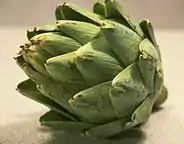Artischocke
German

Artischocke
Alternative forms
- Artischock (obsolete)
Etymology
From Northern Italian articiocco, from Provençal archichaut, arquichaut, from Old Spanish alcarchofa, from Andalusian Arabic الْخَرْشُوف (al-ẖaršúf), from Arabic الْخُرْشُوف (al-ḵuršūf), definite form of خُرْشُوف (ḵuršūf).[1][2]
Pronunciation
Audio (file)
Noun
Artischocke f (genitive Artischocke, plural Artischocken)
- artichoke (edible plant related to the thistle)
Declension
Declension of Artischocke [feminine]
| singular | plural | ||||
|---|---|---|---|---|---|
| indef. | def. | noun | def. | noun | |
| nominative | eine | die | Artischocke | die | Artischocken |
| genitive | einer | der | Artischocke | der | Artischocken |
| dative | einer | der | Artischocke | den | Artischocken |
| accusative | eine | die | Artischocke | die | Artischocken |
Descendants
- → Kashubian: artëczok
References
- Elcock, W. D. (1960) The Romance Languages, page 282: "Borrowed directly from the Qairawān–Sicily region, without the article, the same Arabic word appears in Italian as carciofo; the Spanish form penetrated, however, into Provence, where it became archichaut, arquichaut, and thence into northern Italy as articiocco".
- “alcachofa”, in Diccionario de la lengua española, Vigésima tercera edición, Real Academia Española, 2014
Further reading
- “Artischocke” in Duden online
- “Artischocke” in Digitales Wörterbuch der deutschen Sprache
This article is issued from Wiktionary. The text is licensed under Creative Commons - Attribution - Sharealike. Additional terms may apply for the media files.